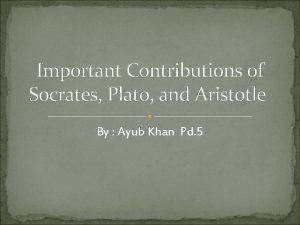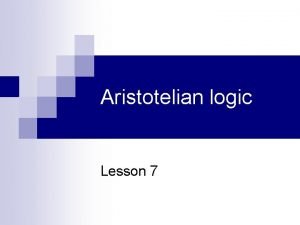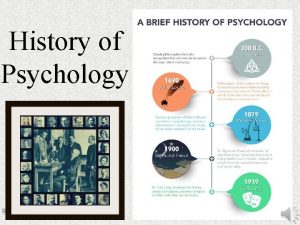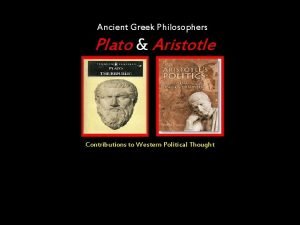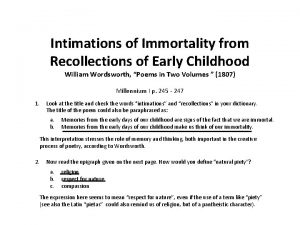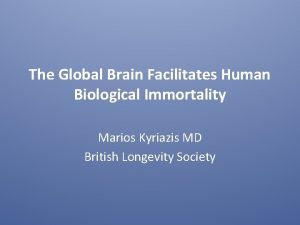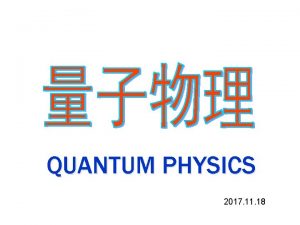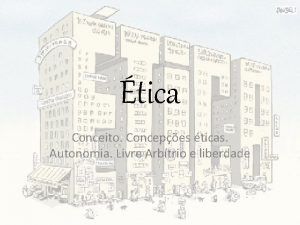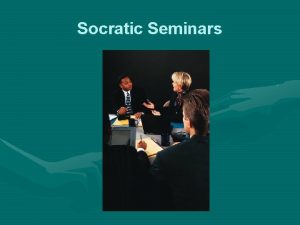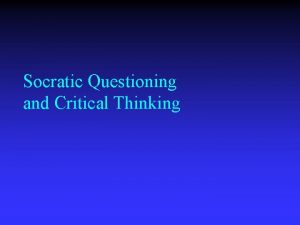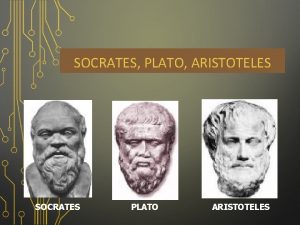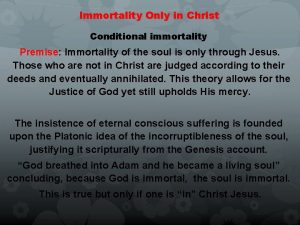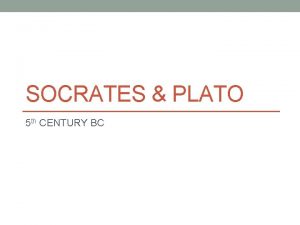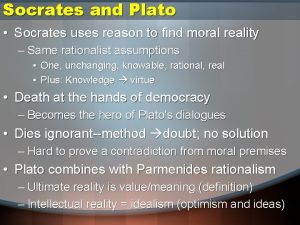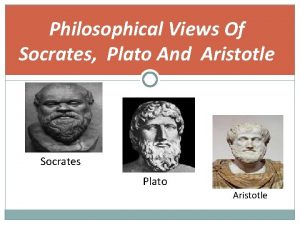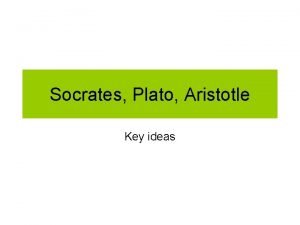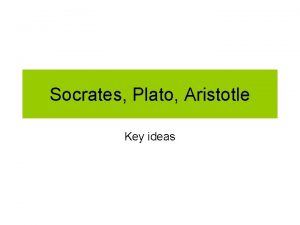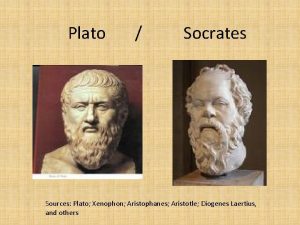Immortality Plato and Penelhum Plato and Immortality Socrates











- Slides: 11

Immortality Plato and Penelhum

Plato and Immortality Ø Socrates was convicted by the Athenians of impiety and the corruption of youth Ø Plato’s Phaedo describes Socrates’ final day in prison and his death Ø Was developed by Plato during his middle period where it seems that he was beginning to develop Socrates’ ideas l In an earlier dialog Socrates was unsure of the status of the soul after death.

The Theory of Forms Ø In addition to the sensible world (in space and time), there is another world that can be grasped only by the mind Ø This intelligible (non-sensible) world consists of Forms Ø Sensible things arise by participating in the corresponding Form l They exist insofar as they embody the perfection of the corresponding Form

The Exclusion of Opposites Ø In Phaedo, Socrates explains that a Form is completely what it is, and contains nothing of its opposite l l Absolute largeness will never contain absolute smallness As something small grows, it moves from the Form of smallness to one of Largeness

Fire, Snow, and Soul The essential trait of fire is hotness and the essential trait of snow is coldness Ø Heat is the opposite of cold and if heat approaches snow it will be incompatible with the cold of snow Ø l When heat overtakes snow it will cease to exist A rock will become hot because heat is the essential trait of fire Ø He then uses this for the human body Ø l l l What make the body alive? A body is alive because it has a principle of life, and the name of this principle is soul As heat is the essential trait of fire, life is the essential trait of soul

Life Excludes Death Ø No thing can appropriate a quality that is the opposite of a quality that is an essential part of its nature l Fire cannot receive cold and still be fire Ø The opposite of lie is death Ø Life is the essence of the soul l l The soul cannot appropriate death and still be a soul Because the soul cannot receive death, it is immortal

The Immortal and the Imperishable Ø Ø Ø He shows that the soul is immortal but in what sense? The soul is deathless so it cannot be dead and still be a soul (like a fire cannot be cold and still be a fire) Perhaps when the body dies, the soul retreats into nothingness Plato has to show that the soul is not only immortal but imperishable He argues that everything that is immortal is also imperishable l l he says that it is obvious that there must be some things that are imperishable and if anything is to be included in this group it would be immortal things Since the essential trait of the soul is life, it would be paradoxical if the soul perished at the approach of death

Terence Penelhum Ø Born in 1929; went to Edinburgh University and then Oxford; taught at Yale and the U of Alberta in Edmonton, Canada Ø Sees the question of immortality as closely related to the notion of personal identity Ø If I believe that my soul survives death, in what sense does “I” exist in the next life?

Spiritual Substance and Identity Ø Two criteria for personal identity l l l Mental criterion theory: what makes a person the same is the spiritual substance Penelhum rejects this because we cannot observe any such spiritual either in ourselves or in other people So we have no way of knowing if it is true if we or anybody else are the same over time

Memory and Identity Memory is a mental criterion alternative to spiritual substance Ø It does not require an unchanging spiritual core because it is a a relationship among fleeting mental events Ø Penelhum finds two problems Ø l l l People forget having done things; if memory is of a past event is the criterion for determining if he or she is the same person who did the deed, then the memory criterion is inadequate; because I don’t remember doing something doesn’t mean that I didn’t do it. To say that a person remembers doing something means not merely that the person remembers it but that it is true. To determine whether it is true we need to know if the person actually did it • In order to determine this we need a criterion of identity independent of memory • The body seems to be the most plausible

Resurrection and Personal Survival If the body is necessary for personal identity then it would seem difficult to defend a belief in immortality Ø How could I survive death and continue to be me in another world? Ø One way to resolve this is to believe in the resurrection of the body and through the power of God we are reunited body and soul Ø Penelhum disagrees with this too because identity would be based on the new bodies Ø There would be no continuity between this life and the next Ø
 A student of socrates he wrote down his
A student of socrates he wrote down his Aristotelian logic
Aristotelian logic Socrates and plato psychology
Socrates and plato psychology Socrates plato and aristotle worksheet answer key
Socrates plato and aristotle worksheet answer key Our birth is but a sleep and a forgetting explanation
Our birth is but a sleep and a forgetting explanation Quiz on tintern abbey
Quiz on tintern abbey Biological immortality humans
Biological immortality humans What is quantum
What is quantum Carolina henriquez
Carolina henriquez Arbtrio
Arbtrio What is a seminar
What is a seminar What is the socratic method of teaching
What is the socratic method of teaching
